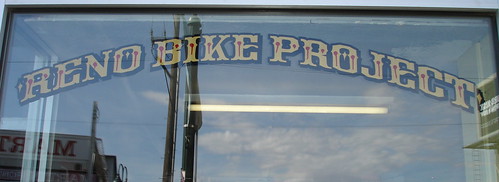
We still have a few minor loose ends to finish up, but today we finally can say we have completed our Reno Bike Project, project. Amazing what we got done when we got some consistent time to work the last two weeks (although we took three required assessment tests this week). As I’ve mentioned in my last 2 posts, I turned the responsibility for the last 6 web pages over to each of the six groups in my room with minimum direction (each group was given one of the pages to do randomly – they had to do the page they got). At the end of the day Tuesday the pages were pretty sad and I was afraid maybe they weren’t ready to take this on. But Wednesday we looked at each page as a class and brainstormed ideas and I saw major improvement. Thursday we looked at some professionally made pages and things really improved, and today they just went nuts. The wikis really came out well, with only “consulting” duties on my part, mainly at the request of the students … “does this look better or should we do it like this?”
We also put the final touches on our PSA (video) which had to be re-edited to change the URL it references. So today we burned multiple DVD copies to send to local TV stations.
So what went into doing this project?
*We had a class meeting when this opportunity first came up to decide whether or not to take on the project in the first place.
*We took a field trip to the Reno Bike Project where we shot video and took many of the digital photos we archived on our Flickr accounts.
*We had guests visit our classroom and talk to us about the Reno Bike Project, bicycle racing and the health benefits of bicycling.
*We researched on the web for information for all the wiki pages we designed and to learn more about the science curriculum that was much of the basis for this project.
*We used our Diigo account to archive and annotate much of our research.
*Maggie Tsai from Diigo visited our classroom and taught students about Diigo and encouraged them about the work they were doing.
*We storyboarded, wrote (as a whole class shared writing) the script for our PSA.
*We had numerous discussions about the order of scenes and wording and which clips made the most impact.
*We practiced and then recorded the voiceovers for the video.
*We designed posters, one of the loose ends we need to finish … we have to change the URL on those before we publish them … will probably put some on our Flickr account later.
*We peer edited each others’ work over and over checking writing style and content and whether or not links worked correctly or whether someone could be understood on the video.
Students set up various photos to use in class and outside and took them themselves.
*We Skyped in Will Richardson to talk about healthy eating habits, specifically being a vegetarian.
*We blogged about various aspects of the project.
*Students designed graphics for the PSA and for images on their wikis and posters.
*Students designed the layouts for their wiki pages.
*Students noted “experts” (classmates) at certain aspects of getting the formatting of their wikis to look “right” or import a photo and would enlist their help … which was fun to watch. “Why is she over in your group?” … “Because she knows how to get this photo to show up on the right part of the page with the caption under it and she’s showing us how.”
*Lots of collaboration, planned and not (see above).
*Lots of “messy” learning … mostly NOT planned. : )
*I’m sure I left out lots, but it’s getting late.
Learning is messy!
Tags: RenoBike Project, messy learning, Skype, Flickr,
